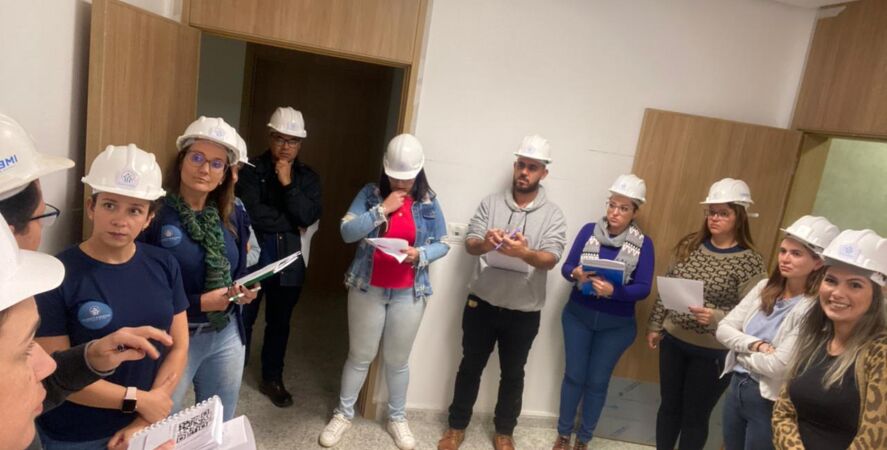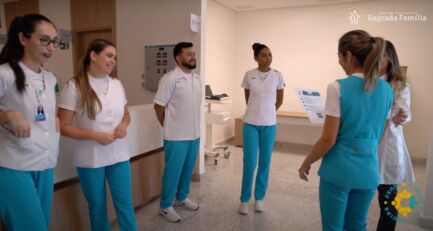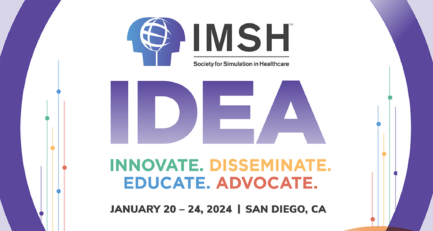
Since 2019, the Center for Medical Simulation and IMEPAC in Araguari, Brazil have partnered on the development of healthcare faculty, continuous readiness, and staff resilience through the CMS Affiliates Program.
This year in August, IMEPAC opened their new hospital, Hospital Universitário Sagrada Família (HUSF). This new institution has been a case study in how to build in continuous learning from the ground up for staff and teams across the entire hospital.
Dr. Chris Roussin, CMS Senior Director of Education Leadership and International Programs, recently spoke to two large groups of medical students and new interns at HUSF, emphasizing the ongoing “learning journey” in a medical career to both groups. He has formed a deep partnership with both Dr. Henrique Arantes and the overall organization. Dr. Roussin says, “The leadership team at IMEPAC and the new University Hospital Sagrada Familia are very special people. Jose Julio Lafayette, Dean of IMEPAC and president of HUSF, is building a people-first organization, and there is total commitment to creating a community that learns and develops every day. I feel that we are an important part of that effort and it’s a wonderful feeling.”
Two years ago, the proposed HUSF underwent significant on-site and hospital-wide simulation testing in conjunction with CMS and leaders from Mater Education, another CMS Affiliate in Brisbane, Australia. The hospital also built learning into the organizational structure by creating a new C-Suite level position, Chief Learning Officer, which is now held by Dr. Arantes. The rigorous design of ground-level systems for continuous learning and improvement can be counterposed against the common complaint within existing hospitals that systems are too rigid and behaviors and cultures too ingrained to grow or change.
Dr. Arantes describes the many projects around continuous and experiential learning the hospital is implementing to provide literacy and capacity around quality and safety procedures for all hospital employees: For the past six months, specialized facilitators have been training in Circle Up©, an informal system of daily huddles, peer check-ins, and debriefings to support safe care, adaptability, and the well-being of the workforce. In addition to training in this system, the new debriefings were also simulation tested in-situ, finding the best physical spaces within the new hospital to debrief and discuss cases in privacy ward by ward while also taking the least transit time. Of CMS, he says, “The partnership with CMS has been very important to help us to create and shape programs and projects to create a learning and resilient organization, focusing on patient safety and employees well-being and growth.”
The hospital is also implementing a new form of the sometimes-dreaded Morbidity and Mortality conference, known as Listen and Learn (L&L). Rather than focusing learning time only on the negative, teams across the hospital will examine performance using the lens of safety to debrief highly successful and routine cases, as well as poor outcomes. By routinely debriefing across teams, this program will create a much more routinized and psychologically safe space to discuss potential errors and areas for improvement, as well as surfacing excellent performance to be learned from. Process rather than outcome oriented, this program recognizes that poor outcomes can still result from perfect performance in healthcare, and that by examining frames, actions, and results, providers can make continuous growth. Lon Setnik, CMS Associate Director of Clinical Programs, has been vital in this work.
The hospital learning office is also developing a Bedside Readiness program founded on CRM principles to develop expert teams. This includes using in-situ simulation across the hospital to get teams ready to perform their best in the spaces where they work, as well as using serious play and team building projects to break professional silos and create an interprofessional community of learning. It also includes plans for an HUSF Academy, a source of support for team members who wish to attend conferences, take courses, and grow professionally from experts around the world. The Academy will support high achievers in facilitating their own learning as well as teaching what they have learned to staff at the hospital, creating a sense of belonging and shaping the culture.
HUSF opened in early August with one ward and 110 beds available; at full capacity the hospital will be what in Brazil is classified as a tertiary hospital, with 335 beds.

